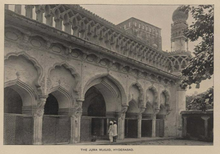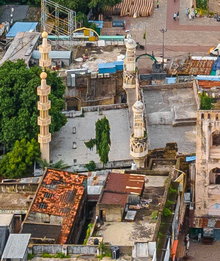| Jama Masjid, Hyderabad | |
|---|---|
 | |
| Religion | |
| Affiliation | Islam |
| Location | |
| Location | Hyderabad, Telangana, India |
| Architecture | |
| Style | Qutb Shahi |
The Jama Masjid is a mosque in Hyderabad. [1] [2]
It is located to the North-East of the Charminar. [3]
History
It was commissioned by Muhammad Quli Qutb Shah in 1597–98. [4] [5] It served as the served as the congregational mosque of the newly established city of Hyderabad, until the much larger Mecca Masjid was constructed in the 17th century. [1]
The mosque underwent heavy restorations during the rule of Asaf Jah III. [3]
Description

Inscriptions
The mosque has two inscriptions. The first is above the entrance gate, in Nastaliq script, contains verses praising the ruler and also records the year of construction of the mosque. [3]
The second inscription is located above the prayer niche. The verses 137 and 138 of the second chapter of the Quran are inscribed in the Thuluth script, along with the name of the artist and year of inscription. [3]
References
- ^ a b Khalidi, Omar (2009). A Guide to Architecture in Hyderabad, Deccan, India (PDF). p. 40. Archived from the original (PDF) on 2020-03-13.
- ^ "Hyderabad's first Jama Masjid remains consigned to oblivion". The Times of India. 2017-09-10. ISSN 0971-8257. Retrieved 2023-07-23.
- ^ a b c d Bilgrami, Syed Ali Asgar (1927). Landmarks Of The Deccan. pp. 26–29.
- ^ Haig, Thomas Wolseley. Historic Landmarks of the Deccan. p. 210.
- ^ Campbell, A. C. (1898). Glimpses of the Nizams Dominions. pp. 168–169.
| Jama Masjid, Hyderabad | |
|---|---|
 | |
| Religion | |
| Affiliation | Islam |
| Location | |
| Location | Hyderabad, Telangana, India |
| Architecture | |
| Style | Qutb Shahi |
The Jama Masjid is a mosque in Hyderabad. [1] [2]
It is located to the North-East of the Charminar. [3]
History
It was commissioned by Muhammad Quli Qutb Shah in 1597–98. [4] [5] It served as the served as the congregational mosque of the newly established city of Hyderabad, until the much larger Mecca Masjid was constructed in the 17th century. [1]
The mosque underwent heavy restorations during the rule of Asaf Jah III. [3]
Description

Inscriptions
The mosque has two inscriptions. The first is above the entrance gate, in Nastaliq script, contains verses praising the ruler and also records the year of construction of the mosque. [3]
The second inscription is located above the prayer niche. The verses 137 and 138 of the second chapter of the Quran are inscribed in the Thuluth script, along with the name of the artist and year of inscription. [3]
References
- ^ a b Khalidi, Omar (2009). A Guide to Architecture in Hyderabad, Deccan, India (PDF). p. 40. Archived from the original (PDF) on 2020-03-13.
- ^ "Hyderabad's first Jama Masjid remains consigned to oblivion". The Times of India. 2017-09-10. ISSN 0971-8257. Retrieved 2023-07-23.
- ^ a b c d Bilgrami, Syed Ali Asgar (1927). Landmarks Of The Deccan. pp. 26–29.
- ^ Haig, Thomas Wolseley. Historic Landmarks of the Deccan. p. 210.
- ^ Campbell, A. C. (1898). Glimpses of the Nizams Dominions. pp. 168–169.